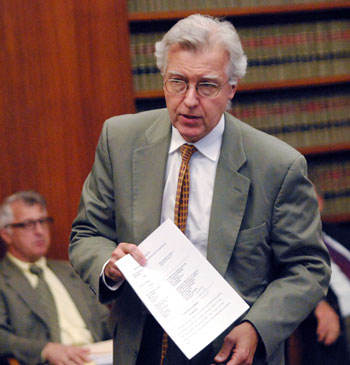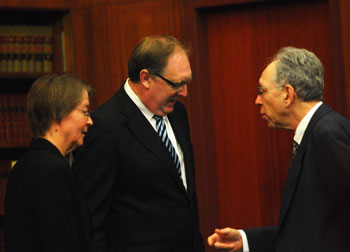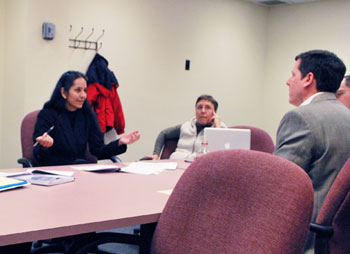Decision on Sanctions Shifts from Shelton
At an Aug. 27, 2014 hearing, judge Donald Shelton denied two of three procedural motions by plaintiffs in the footing drain disconnection lawsuit that was filed against the city of Ann Arbor in February. He delaying ruling on a third motion.

Dan O’Brien of Woods Oviatt Gilman in Rochester, New York gave oral arguments for the plaintiffs in the Yu v. City of Ann Arbor case on Aug. 27, 2014. Here he was providing the court with supplemental documentation on proof of service for the three motions in front of judge Donald Shelton, on Shelton’s last motion day before retirement. The issue of proper service was not explicitly argued on Aug. 27 and appeared resolved in favor of the idea that service had been proper. (Photos by the writer.)
The case involves a claim of unconstitutional takings – inverse condemnation. Plaintiffs in the case, Yu v. City of Ann Arbor, are three Ann Arbor residents who had their footing drains disconnected under the city FDD program.
On his last motion day before retirement, Shelton chose to deny a motion to disqualify the city attorney’s office in its representation of the city. That motion was based on the plaintiffs’ contention that testimony on non-privileged matters would be required of assistant city attorney Abigail Elias.
Shelton’s ruling to deny the motion to disqualify Elias came only after Elias answered what Shelton portrayed as the key question: Would the city’s defense of the lawsuit depend on a contention that the ordinance was enacted based on the opinion of counsel? Elias indicated that she did not think it was relevant, but Shelton insisted on an answer, telling her that if the city wanted to use that as part of its defense, “you’re out of here.” So Elias told Shelton the city would not be using that as part of its defense. Shelton later made clear that such a defense would not be allowed.
In making his ruling on the disqualification issue, Shelton appeared to indicate that he did not think relevant factors in the case included the city’s stated rationale for enacting the FDD ordinance – on grounds of public safety health and welfare – or the efficacy of the ordinance in reducing sanitary sewer overflows and backups. The case was not about whether the FDD ordinance was a good idea, he said, but rather about whether it was a lawful idea.
Shelton also denied a motion to reassign the case away from judge Timothy Connors – who will be taking over all of Shelton’s civil cases after Shelton’s last day as judge on Aug. 29. On that motion, Shelton pointed out that he did not have the power to grant it. He declined to say anything about what he thought regarding the merits of the motion, and indicated that such a motion should go through the regular disqualification process. That entails making a motion in front of the judge to be disqualified – and if the judge declines to disqualify himself, possibly appealing to the chief judge of the circuit court, who is David Swartz.
However, Shelton delayed ruling on a third motion, on sanctions against the city’s attorneys – for making statements in a brief in support of summary disposition that plaintiffs contend did not have a basis well-grounded in fact. Shelton questioned assistant city attorney Abigail Elias closely on the matter, and appeared to indicate some agreement with plaintiffs’ contention that the city had, in its brief filed with the court, mischaracterized the plaintiffs’ position. And during back-and-forth with Shelton, Elias herself stopped just short of admitting that her choice of the word “concede” was a misrepresentation of the plaintiffs’ legal position – something she described as possibly an overstatement in the course of zealous representation of her client.
Shelton indicated that the motion on sanctions – in connection with the brief on summary disposition – should be heard at the same time the motion on summary disposition is heard. So Shelton indicated he would be adjourning that motion until Sept. 18. That hearing on summary disposition is scheduled before Connors.
No substantive matters have yet been decided in the case, which the city first removed to federal court. However, the plaintiffs moved for remand from the federal court back to the circuit court – a motion that was granted by judge Avern Cohn in late May. When the case returned to the circuit court, plaintiffs filed a motion for a preliminary injunction, which was heard and denied by Shelton in early July. The city had filed a motion for summary disposition on June 9, which was originally scheduled for July 30. It was subsequently rescheduled by the city for Aug. 13, and then shifted by the city again to Sept. 18 – which is after Shelton’s scheduled retirement.
When Shelton ruled on the motions after listening to each side, he prefaced the ruling with some general commentary reflecting his 24 years of experience as a judge, which were coming to an end. That commentary highlighted the idea of “winnowing” out the extraneous issues introduced by lawyers on both sides to focus on what a case was actually about.
For the disqualification issue, Shelton wanted to know two things: What specific non-privileged testimony, relevant to the central issue of the case, would be required from Elias? Would the city use as part of its defense the claim that the ordinance had been enacted based upon the opinion of legal counsel? For the judge reassignment issue, the question Shelton identified and answered himself was: Do I have the power to decide this motion? And for the motion on sanctions, Shelton indicated that the central question was: When and in what context should the motion be decided?
A more detailed report of the proceedings is provided below. Dan O’Brien of Woods Oviatt Gilman in Rochester, New York was asked by Shelton to argue all motions in one speaking turn, which he did in the following order: (1) motion to disqualify; (2) motion to reassign away from Connors; and (3) motion for sanctions. [Full Story]





